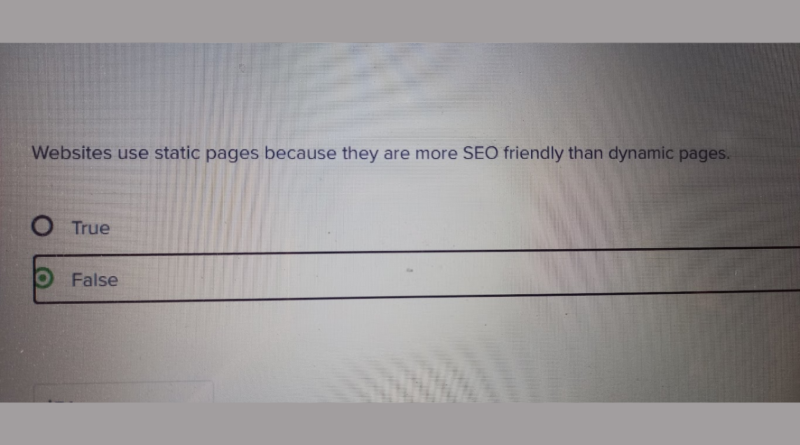Websites use static pages because they are more SEO friendly than dynamic pages.
Websites use static pages because they are more SEO friendly than dynamic pages. Fiverr SEO Skill Test
Option 1 – True
Option 2 – False
Answer – False
Explanation
It is not accurate to say that static pages are inherently more SEO-friendly than dynamic pages. A website’s SEO (Search Engine Optimization) friendliness depends on various factors. You can optimize static and dynamic pages effectively.
What are Static Pages?
Static pages are pre-rendered HTML pages served to users as they are. They don’t change unless manually modified. Some advantages of static pages for SEO include the following:
Page Loading Speed
Static pages load faster because they don’t require server-side processing or database queries.
Crawlability: Search engine crawlers analyze static pages as simple HTML files without complex scripts or dynamic content.
Indexing
Static pages have clear URLs and have better chances of being indexed and ranked by search engines.
What do you mean by Dynamic Pages?
Dynamic pages are generated on the fly based on user requests and data from a database. They offer greater flexibility and interactivity. While dynamic pages present some technical challenges for SEO, you can still optimize them effectively:
Content Updates
Dynamic pages allow frequent content updates, which benefit SEO as search engines favor fresh and relevant content.
Structured Data
Dynamic pages incorporate structured data markup, providing additional information to search engines and enhancing search result listings.
Personalization
Dynamic pages tailor content based on user preferences, increasing engagement and user satisfaction.
Ultimately, the SEO friendliness of a website depends on various factors, including content quality, keyword optimization, proper use of metadata, mobile-friendliness, website architecture, internal linking, and backlink profile. You can optimize static and dynamic websites for SEO success by following best practices and considering the specific requirements of search engines.

